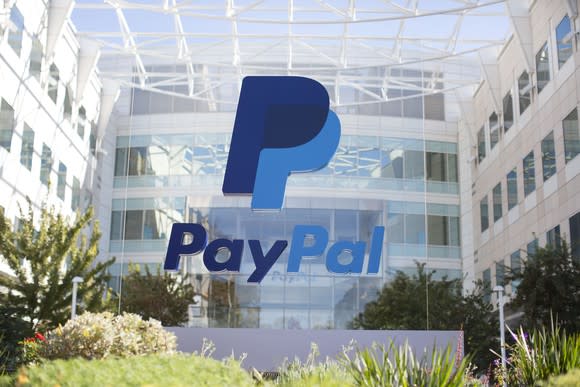PayPal Eyes a 30 Million Person Market
Fintech has turned its focus on the under-banked and unbanked population in 2018. Square (NYSE: SQ) is offering more and more services to Cash App users, including accepting direct deposits from employers. Amazon (NASDAQ: AMZN) is reportedly in talks with banks to offer a checking account-like service to its unbanked customers to make it easier for them to buy stuff on its website.
And now PayPal (NASDAQ: PYPL) is planning to revamp its services for the unbanked including offering a debit card, check deposits, and direct deposits into your PayPal account as well as maintaining its consumer loans business. It's aggregating services from several small banks to offer a complete solution for consumers.
PayPal COO Bill Ready says there are 30 million Americans without a bank account spending an average of 9.5% of their income on fees from alternative financial services. While services like PayPal's or Square's won't be entirely fee-free, it could save people a lot of money while generating meaningful revenue for either company.

Image source: PayPal.
Competing with Cash App
Square ended 2017 with 7 million Cash App users and a lot of momentum. The momentum in Cash App usage truly picked up after Square introduced a prepaid debit card attached to users accounts and the ability to purchase bitcoin. CEO Jack Dorsey said building an ecosystem of consumer financial services a la its merchant services ecosystem will be one of its key focuses of 2018 during the company's fourth-quarter earnings call.
That makes Cash App a major threat to PayPal and its subsidiary Venmo. If more people start using Cash App to receive their paycheck, or just to buy some bitcoin, it's more likely they'll use it to send money to their friends, or pay for goods in stores. PayPal would much rather people use Venmo, its mobile peer-to-peer payments app, to send friends money.
Venmo had an estimated 10 million users as of last August, and it's rapidly growing. Payment volume on the app nearly doubled in 2017 to $35 billion.
PayPal is betting big on Venmo as a growth engine in the future. It plans to monetize Venmo in a similar manner by which it monetized its flagship product: by enabling merchants to accept payments via Venmo. And while that might cannibalize PayPal's main business, management is fine with that because it could ultimately produce a better profit margin.
The growth of Cash App is a big threat to PayPal and its plans for Venmo, so anything PayPal can do to stop users from flocking to Cash App can help.
PayPal is in the driver's seat
84% of Americans say they're interested in managing their money from one online central platform for deposits, spending, and saving, according to a recent survey from Koski Research. Importantly, PayPal is currently best-equipped to offer such a service with its wide use among online retailers; it can easily support spending accounts. Its plan to partner with banks should enable it to support various forms of deposits, and it could offer a savings vehicle down the road, producing interest on other people's money.
But Square isn't too far behind. While it has an ecosystem of merchants, it's not integrated with its consumer app. That said, the Cash Card has proven popular with users in just a few months. In December, Cash Card users spent over $90 million using the prepaid debit card -- a $1 billion per year run rate. Meanwhile, Square's bitcoin platform offers a way to invest from the same account.
Amazon is the dark horse. It could develop a platform that offers everything consumers are looking for, and it doesn't even have to make a profit on the service itself. Amazon's end game with its rumored banking service appears to be facilitating online commerce. Since Amazon owns such a large share of online retail, it stands to benefit from giving consumers more ways to save and spend money.
For now, PayPal is in the driver's seat when it comes to serving the unbanked, but it needs to be sure to move quickly before the competition comes in and takes away its customers before it even has a full-fledged product. Ready says it'll only be a matter of weeks before its new financial services are available to consumers.
More From The Motley Fool
John Mackey, CEO of Whole Foods Market, an Amazon subsidiary, is a member of The Motley Fool's board of directors. Adam Levy owns shares of Amazon. The Motley Fool owns shares of and recommends Amazon and PayPal Holdings. The Motley Fool owns shares of Square. The Motley Fool has a disclosure policy.

 Yahoo Finance
Yahoo Finance 